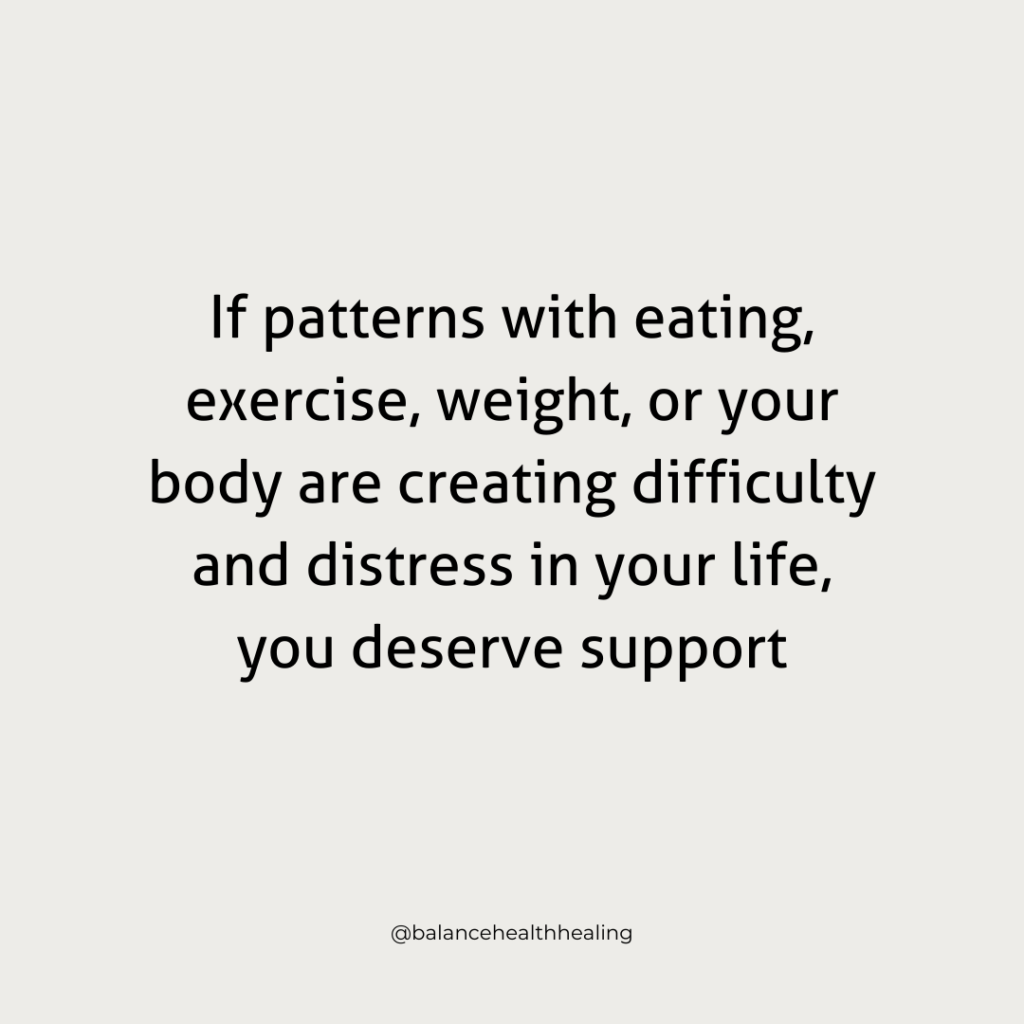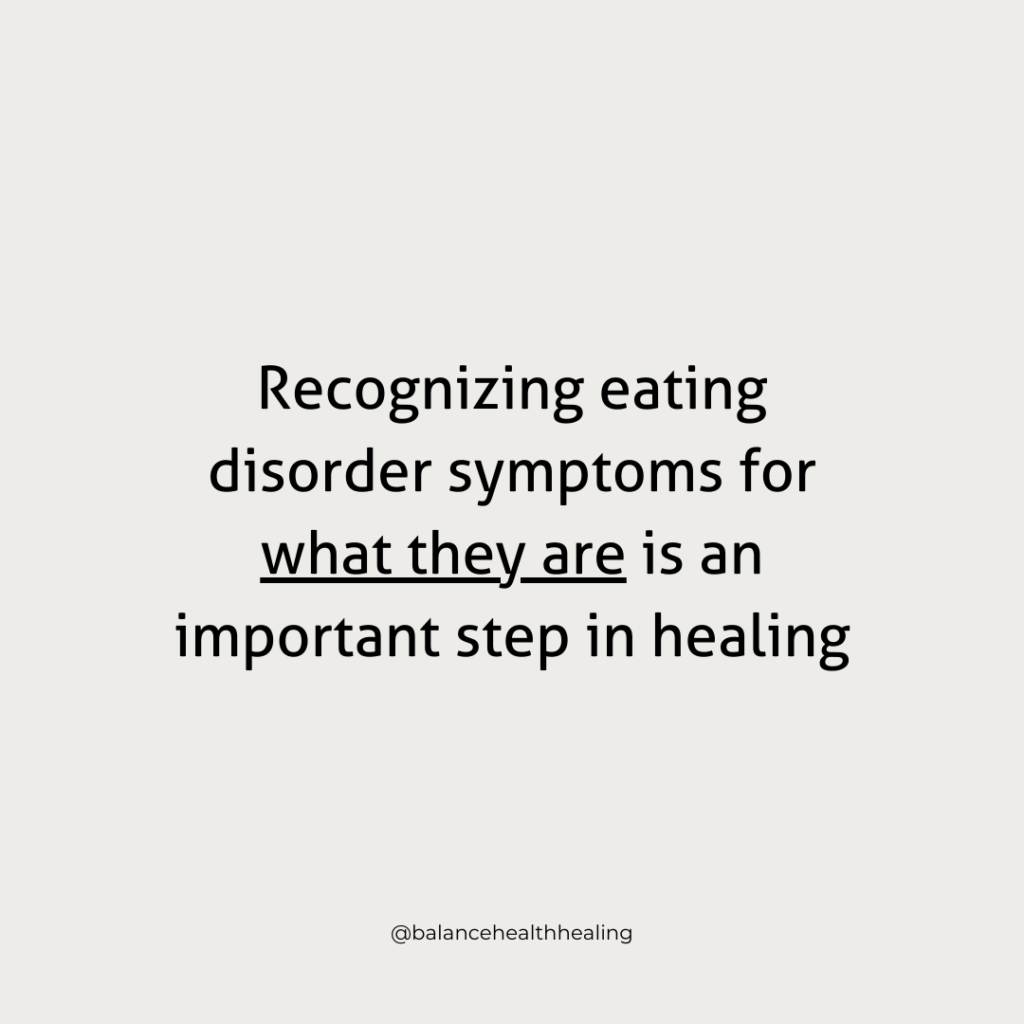Many of the clients I work with go months, and even years, living with an eating disorder and not realizing it. Often, a piece of our work in therapy has to do with coming to the realization that they are indeed dealing with an eating disorder. Recognizing eating disorder symptoms for what they are is an important step in healing. In today’s blog, I want to talk about some of the warning signs that an eating disorder may be present in someone’s life. This is not a comprehensive list of all eating disorder symptoms, nor does it represent every person’s experience in an eating disorder.
 Before I even begin listing some eating disorder symptoms, one point I want to make clearly is that a person’s body weight alone does NOT determine whether or not they have an eating disorder. Eating disorders impact people across the spectrum of body size and shape. Less than 6% of people diagnosed with an eating disorder are medically underweight. For sources on this statistic and others, see the National Eating Disorders website https://www.nationaleatingdisorders.org/statistics/#general-eating-disorder-statistics
Before I even begin listing some eating disorder symptoms, one point I want to make clearly is that a person’s body weight alone does NOT determine whether or not they have an eating disorder. Eating disorders impact people across the spectrum of body size and shape. Less than 6% of people diagnosed with an eating disorder are medically underweight. For sources on this statistic and others, see the National Eating Disorders website https://www.nationaleatingdisorders.org/statistics/#general-eating-disorder-statistics
Some common eating disorder signs and symptoms:
Fear of gaining weight or of not being able to lose weight
One of the signs of an eating disorder is strong worry or fear about your body weight. You might be weighing yourself frequently, thinking about your weight constantly, or worrying about how what you eat will impact your weight.
Rigid food “rules”
If you notice that you have strict rules about what and how you eat, this could be a sign of an eating disorder. For example, someone with an eating disorder might have rigid rules about how many calories they eat, how often they eat, or what types of food they can or cannot eat. Typically, these “rules” are also accompanied by excessive guilt or worry about breaking the rules.
Sporadic eating patterns
Another sign of disordered eating is sporadic or chaotic eating. This could look like restrictive eating followed by out-of-control or binge eating, followed by more restriction, etc. It could look like frequently skipping meals or snacks, or avoiding eating at regular intervals. It could look like eating a lot at one point in the day, and then very little at other times in the day. If sporadic eating patterns have become the norm, they may be a sign of an eating disorder.
Compensation for eating
Feeling the need to compensate or “make up” for eating can be a sign of a disordered relationship with food. This could mean feeling the need to exercise in order to feel ok about eating or purging after eating (through vomiting, laxatives, exercise, or fasting).
Obsessive thoughts about food
Constantly thinking about food can be a sign of undernourishment, as well as a sign of disordered eating. Obsessive thoughts about food might feel anxious, distracting, or out of control. Excessive guilt or overthinking about eating can also be a sign of a disorder.
High distress about body shape and weight
Feeling very negatively about yourself because of your body weight or shape can be part of an eating disorder. Having times when you struggle with body image can be a common experience. However, if a negative or critical perception of your body is starting to interfere with your life on a consistent basis, this could be a sign of an eating disorder.
As I mentioned before, this is not a comprehensive list of eating disorder signs and symptoms. Eating disorders are complex mental illnesses, and vary in severity and presentation.
Some of the things mentioned–counting calories, exercising to earn or make up for food, feeling body image distress, etc. are common experiences in our society. While they are common, they can also be disordered. My hope in sharing this information is to help readers recognize unhelpful patterns with eating and food, and get connected with appropriate support. If patterns with eating, exercise, weight, or your body are creating difficulty and distress in your life, you deserve support.

